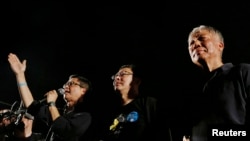The three co-founders of Hong Kong's Occupy movement say they will surrender to police next month, but student leaders say they will not follow their lead.
According to local news reports, co-founders Chan Kin-man, Benny Tai and Chu Yiu-ming formally proposed the idea in a meeting Friday with representatives of the Hong Kong Federation of Students, Scholarism, Pan-democrats and other groups.
The plan is for the trio to give themselves up to police on or after December 5. The South China Morning Post had reported in mid-November that the trio planned to turn themsevles in to police later in November.
In an article published in the Ming Pao newspaper last week, co-founder Chan called on protesters to make a conditional withdrawal or to narrow the scope of occupied areas to reduce inconvenience for the general public.
However, the Federation of Hong Kong Students and the group Scholarism said they will not surrender, instead pledging to remain in the occupied areas and wait to be arrested.
Dispute over stage
Joseph Cheng Yu-shek, a political science professor at City University of Hong Kong, told VOA that while all parties have recognized the umbrella movement as a long-term action, they are conflicted over how to end this stage of the protests.
“To vacate, they do have different opinions,” the professor said, adding that Occupy Central's leaders want to surrender "to show their responsibility to civil disobedience, their respect for the rule of law and their willingness to pay the price."
Students and young people tend to focus more on the engagement process in civil movements, Joseph said, and they have different views in terms of strategy and results.
"Younger generations usually have different views on the civil movements. The older generation is very focused on practical results, while the younger ones often feel the process is the most important thing," the professor said.
The split in strategy comes as several new public opinion polls indicate Hong Kong's public has turned against the movement, with a large majority now calling for an end to the street protests that began in late September.
Last week, police began dismantling some of the protest sites, but have left most of the occupied areas alone.
The demonstrators have been calling for fully democratic elections in 2017. They took to the streets after China ruled in August that all candidates for chief executive must first be approved by a committee that is stacked with pro-Beijing loyalists.
This report was produced in collaboration with the VOA Mandarin service.




